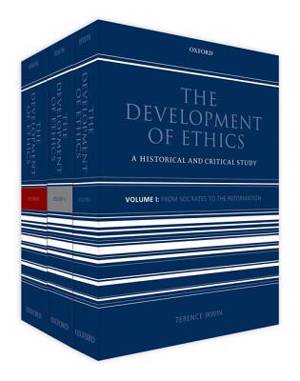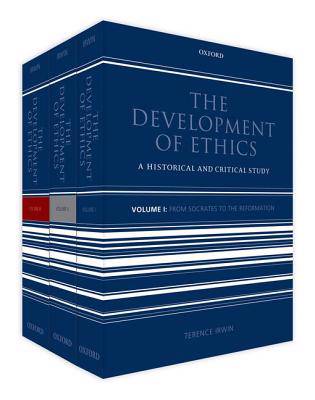
- Retrait gratuit dans votre magasin Club
- 7.000.000 titres dans notre catalogue
- Payer en toute sécurité
- Toujours un magasin près de chez vous
- Retrait gratuit dans votre magasin Club
- 7.000.0000 titres dans notre catalogue
- Payer en toute sécurité
- Toujours un magasin près de chez vous
Description
The Development of Ethics is a selective historical and critical study of moral philosophy in the Socratic tradition, with special attention to Aristotelian naturalism, its formation, elaboration, criticism, and defence. This three-volume set discusses the main topics of moral philosophy as they have developed historically, including: the human good, human nature, justice, friendship, and morality; the methods of moral inquiry; the virtues and their connections; will, freedom, and responsibility; reason and emotion; relativism, subjectivism, and realism; the theological aspect of morality. Volume 1 examines ancient and medieval philosophy up to the sixteenth century, beginning with Socrates, the Cyrenaics and Cynics, Plato, and then Aristotle. Terence Irwin compares the Stoic position with the Aristotelian at some length; Epicureans and Sceptics are discussed more briefly. Chapters on early Christianity and on Augustine introduce a fuller examination of Aquinas' revision, elaboration, and defence of Aristotelian naturalism. The volume closes with an account of some criticisms of the Aristotelian outlook by Scotus, Ockham, Machiavelli, and some sixteenth-century Reformers. Volume 2 examines early modern moral philosophy from the sixteenth to the eighteenth century, and explores Suarez's interpretation of Scholastic moral philosophy, seventeenth- and eighteenth-century responses to the Scholastic outlook, and the treatments of natural law by Grotius, Hobbes, Cumberland, and Pufendorf. Disputes about moral facts, moral judgments, and moral motivation, are traced through Cudworth, Clarke, Balguy, Hutcheson, Hume, Price, and Reid. Butler's defence of a naturalist account of morality is examined and compared with the Aristotelian and Scholastic views discussed in Volume 1. The volume ends with a survey of the persistence of voluntarism in English moral philosophy, and a brief discussion of the contrasts and connexions between Rousseau and earlier views on natural law. Volume 3 continues the story up to Rawls's Theory of Justice, and takes the comparison between the Kantian and the Aristotelian outlook as a central theme. The chapters on Kant compare Kant both with his rationalist and empiricist predecessors and with the Aristotelian naturalist tradition. Reactions to Kant are traced through Hegel, Schopenhauer, Nietzsche, and Kierkegaard. Utilitarian and idealist approaches to Kantian and Aristotelian views are traced through Sidgwick, Bradley, and Green. Mill and Sidgwick provide a link between eighteenth-century rationalism and sentimentalism and the twentieth-century debates in the metaphysics and epistemology of morality. These debates are explored in Moore, Ross, Stevenson, Hare, C.I. Lewis, Heidegger, and in some more recent meta-ethical discussion. This volume concludes with a discussion of Rawls, with special emphasis on a comparison of his position with utilitarianism, intuitionism, Kantianism, naturalism, and idealism. Since these volumes seek to be not only descriptive and exegetical, but also philosophical, they discuss the comparative merits of different views, the difficulties that they raise, and how some of the difficulties might be resolved. Irwin presents the leading moral philosophers of the past as participants in a rational discussion in which the contemporary reader can participate.
Spécifications
Parties prenantes
- Auteur(s) :
- Editeur:
Contenu
- Nombre de pages :
- 2828
- Langue:
- Anglais
Caractéristiques
- EAN:
- 9780199695287
- Date de parution :
- 15-10-11
- Format:
- Livre
- Dimensions :
- 198 mm x 254 mm
- Poids :
- 4059 g

Les avis
Nous publions uniquement les avis qui respectent les conditions requises. Consultez nos conditions pour les avis.






